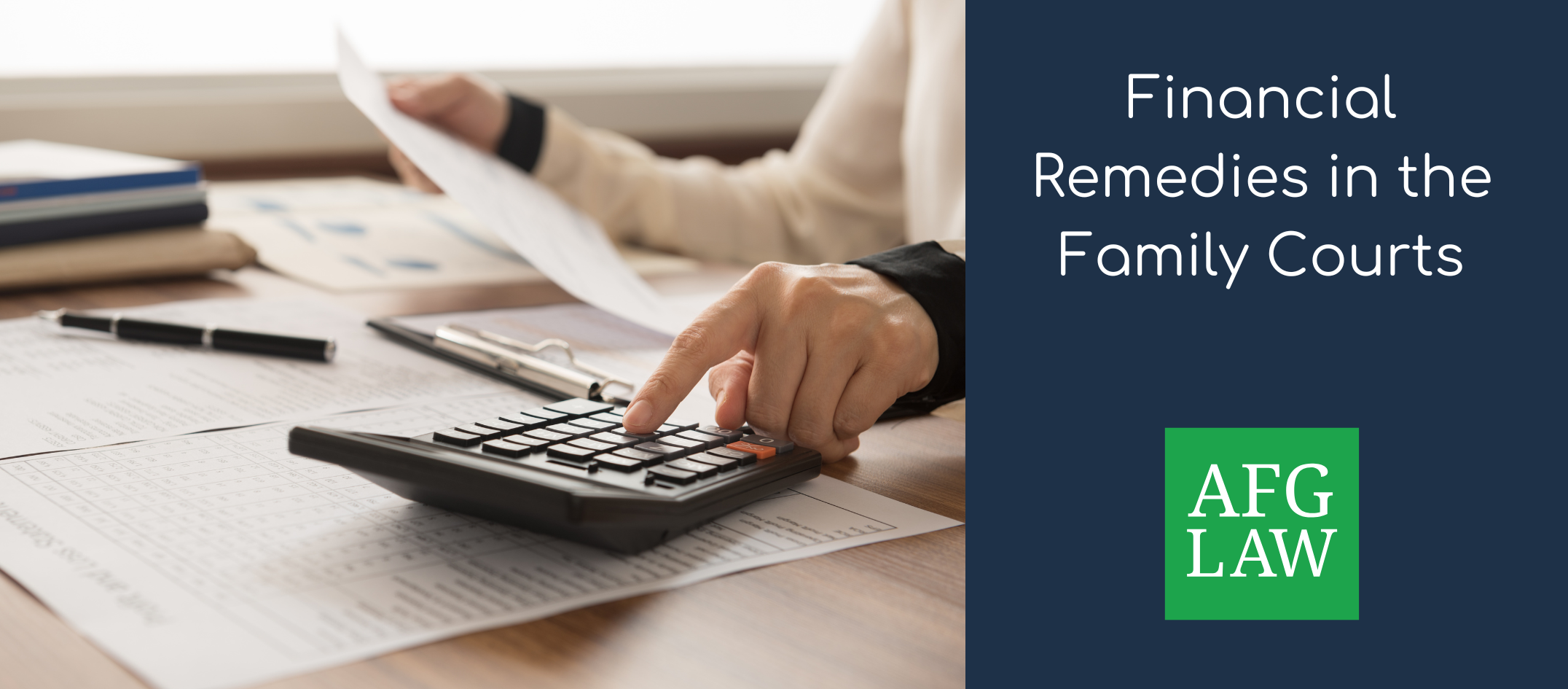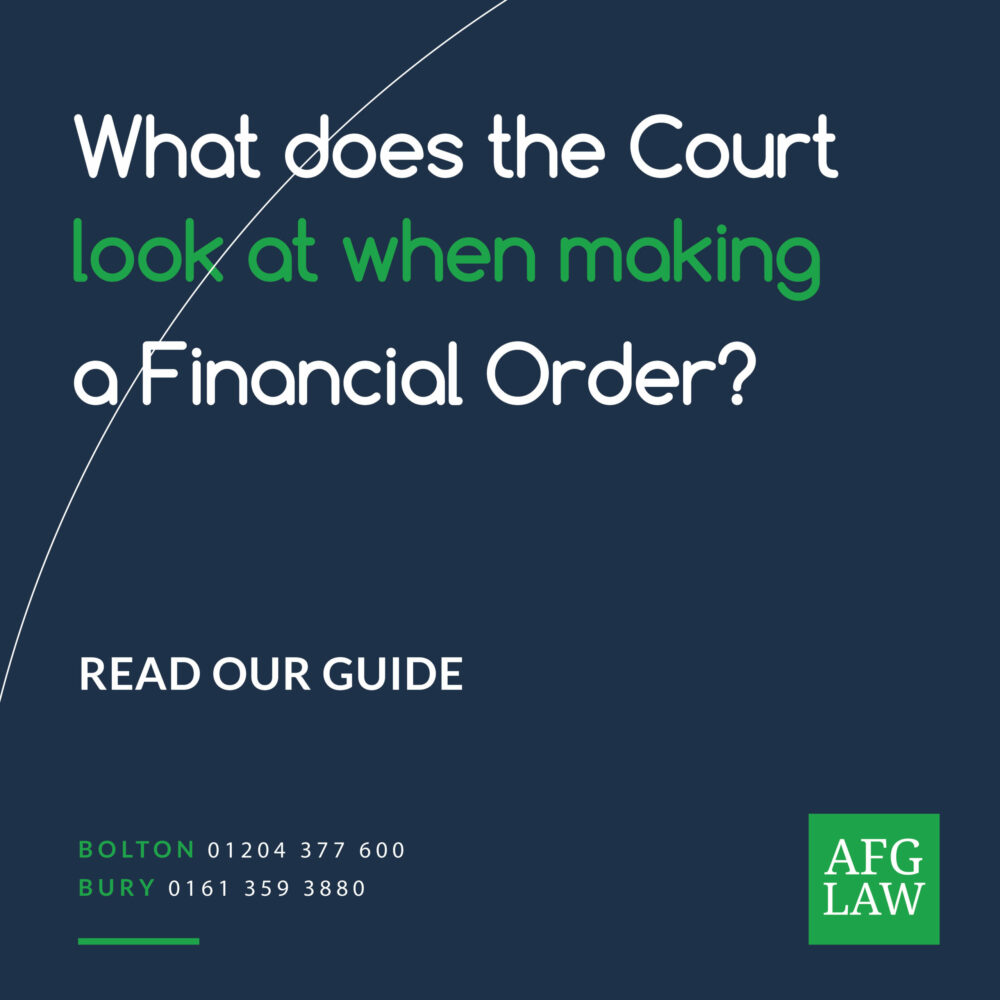At AFG Law our specialist family law solicitors can provide advice to couples who wish to have a prenuptial agreement in place before they marry. This is a complex area of family law and it is important you receive specialist advice; although prenuptial agreements in England and Wales are not strictly binding the Financial Remedy Court will apply the intentions of the parties within the prenuptial agreement unless it is considered to be unfair.
What is a pre-nuptial agreement?
A couple planning to enter a marriage or civil partnership may decide to enter into an agreement that shows what they intend to happen to their money and property if the marriage or civil partnership were to end. The legal rules about these agreements come from the usual laws that apply to divorce, and also the decision of the Supreme Court in Radmacher v Granatino from 2010 when it was decided: ‘The court should give effect to a nuptial agreement that is freely entered into by each party with a full appreciation of its implications unless in the circumstances prevailing it would not be fair to hold the parties to their agreement’.
Should I have a pre-nuptial agreement?
Everyone has their own reasons for entering into a pre-nuptial agreement. It may be that you and your proposed spouse simply like to be as organised as possible with your finances. A pre-nuptial agreement might be particularly beneficial where:
- one of you has substantially greater capital or income than the other
- one or both of you wishes to protect assets you owned prior to the marriage, including inheritances or family trusts
- it would be beneficial to define what is considered to be ‘matrimonial property’ or ‘non-matrimonial property’, for example in relation to business assets owned by one of you prior to the marriage
- one or both of you has children from a previous marriage or relationship and wishes to protect assets for the purposes of inheritance planning
- one or both of you has a connection with, or property in, another jurisdiction
Are pre-nuptials agreements binding?
In England and Wales pre-nuptial agreements are not strictly binding in the event of a divorce, but the terms of a pre-nuptial agreement are persuasive unless the effect of the agreement would be unfair. It is not possible in England and Wales to have a fully binding agreement before a marriage or civil partnership about what will happen on divorce or dissolution.
To ensure that a court will consider a prenuptial agreement fair, both you and your future spouse will need to set out full financial disclosure and take independent legal advice on the agreement and its effects. Our family solicitors can negotiate an agreement using mediation or can negotiate and draft the terms of the agreement on your instructions. It is possible that the court might uphold part of an agreement while considering a different part to have an unfair effect.
When should I get a pre-nuptial agreement?
Not less than 28 days prior to marriage. It can take time to deal with financial disclosure, negotiations and legal advice, so it is important to plan in advance. If your finances, or those of your proposed spouse or civil partner, are complex (for example involving trusts, or international assets) then further time will be needed and specialist advice may be required from, for example, an accountant or a foreign lawyer. You should start the process between 4 and 6 months prior to your wedding day.
Agreements are generally less likely to be considered to be unfair if they are recent, or if circumstances have not changed since the agreement was entered into, and if both people knew exactly what they were agreeing when the agreement was made, both legally and financially, without any undue pressure being applied. It is common to build in provision for the agreement to be reviewed, either after a period of time or when a specified ‘trigger’ event occurs, for example the birth of a child. If the agreement does not take into account the birth of a child, or it is not reviewed and amended after that birth, the court is not likely to uphold its terms.
What will make a pre-nuptial agreement more likely to be binding?
The courts have indicated that in order for an agreement to be considered fair, the following will be taken into account:
- whether both parties to the agreement had independent legal advice before entering into it
- whether there was full financial disclosure—this has generally been interpreted as both parties having sufficient information to make an informed decision on to whether to enter into the agreement with a full understanding of its implications
- whether the terms of the agreement are substantially fair, i.e. does the agreement provide for each party’s basic needs to be met in the event of a divorce?
- that neither party felt pressurised by the other party to enter into the agreement, i.e. that there was no undue influence or duress
- whether there was any fraud or misrepresentation by a party in relation to the agreement, and
- whether legal contractual requirements were followed when the agreement was entered into, including a statement in the agreement that you and your spouse intend to ‘create legal relations’ by entering into the agreement, and that the agreement is executed as ‘a deed’, which includes that it must be witnessed by an independent witness
What can a pre-nuptial agreement include?
A pre-nuptial agreement is a bespoke document drawn up for the two of you for your particular circumstances, so it can cover almost anything you want it to, although your solicitor will be able to advise you as to what types of provision are likely to be enforceable, and the focus of the agreement will be on the financial arrangmeents. There are certain things that couples usually think about when deciding how they would like to arrange their finances in the event of a divorce, including:
- what would happen to property that either of you brought into the marriage?
- what would happen to the family home?
- what would happen to any property given to you or inherited during the marriage or any income or assets derived from trusts?
- what would happen to money held in joint accounts and any property purchased jointly?
- what would happen to any personal belongings or possessions owned before your marriage, or acquired during the marriage?
- what would happen to any saved money earned during the marriage?
- what would happen to your pensions?
- how would you deal with any debts?
- would either of you pay or receive any maintenance and, if so, for how long?
- what kinds of events might require the agreement to be reviewed?
- whether you wish the agreement to be confidential, i.e. that neither of you may disclose all of part of the agreement (save for the purpose of taking legal advice) to a third party or to the press?
- what kinds of arrangements would you like to make for any children you have, or are likely to have, both in financial and in practical terms?
- what arrangements you wish to make if either of you should die during the marriage, and whether you intend to enter into a Will to make provision for each other in the event of death?
- who will pay the costs regarding preparation of the agreement?
Can a prenuptial agreement prevent a spouse making an application to court if the marriage breaks down?
A pre-nuptial agreement cannot stop the court from considering financial issues (having ‘jurisdiction’) in relation to the marriage, as that would be contrary to ‘public policy’. Neither party can, therefore, agree that they will not make an application for financial provision from the court. This is especially the case when it comes to attempting to restrict any financial provision for children.
What happens if we have children?
A pre-nuptial agreement cannot prejudice the interests of any children in your family. It is common to build in provision for a review of the agreement if and when you have children, so that the children’s needs can be considered and assessed at that time, with possible changes made to any expectations of the adults.
In the event of a divorce, if the court is asked to intervene in financial arrangements its first consideration is always any children involved. If the court considers that an agreement made by the adults may adversely affect their children, for example by restricting any expectations of a lifestyle they would otherwise have had, it is likely to consider that it is not fair to uphold the agreement in the circumstances. It is not possible to ‘contract out’ of giving financial support to or for a child.
What are the advantages and disadvantages of a pre-nuptial agreement?
A pre-nuptial agreement can give more certainty as to financial arrangements in the event that you divorce, provided the agreement is entered into in accordance with the suggested steps as to legal advice and disclosure, and represents a fair arrangement for both parties. It can be an effective way to protect assets that you may have had prior to the marriage, particularly if you, for example, wish to protect assets for the purpose of an inheritance for any existing children of a prior marriage or relationship.
However, because the court will always have jurisdiction in the event of a divorce, entering into a pre-nuptial agreement can sometimes provide a false sense of security. If there is a divorce, and you cannot reach agreement as to how finances can be dealt with, and one of you no longer wishes to proceed in accordance with the terms of the pre-nuptial agreement, the issues may need to be determined by the court although where the court considers the pre-nuptial agreement to have been ‘fair’, it may make an order reflecting the terms of the agreement.
There is little advantage in agreeing terms that will be unfair to one party, particularly if that party has been placed under pressure to agree those unfair terms, has not had independent legal advice or does not have sufficient information (financial disclosure) to make an informed decision on whether to enter into the agreement. In those circumstances the court would be unlikely to consider the agreement to be ‘fair’, although there have been cases where all of the recommended steps have not been followed but a pre-nuptial agreement has still been upheld by the court but this will depend on the extent to which the party who no longer agrees with the terms understood what they were agreeing to.
I’m in a different position than I was when I agreed the pre-nup. What can I do?
Circumstances can change, and in the event of a dispute the court will look at your circumstances as they are at the time the agreement is being considered by the court. What may have been fair at the time of the agreement might not be considered fair if your or your spouse’s circumstances have changed significantly, for example you have had children and one of you has a reduced earning capacity, or one of you has suffered ill health, and the agreement has not provided for those changes either in its original form or by an amended agreement. For this reason it is sensible to include provision in the agreement for there to be either regular reviews, or reviews in the event of certain events occurring.
What will happen if one party no longer wishes to be bound by the terms of a pre-nuptial agreement?
If, in the event of a divorce, one of you no longer wishes to be bound by the pre-nuptial agreement, but the other person does, that person may make an application to the court for the other party to explain why an order should not be made in the terms of the agreement. Whether the court will uphold the agreement will depend on the factors detailed above, but it is for this reason also that you should not enter into a pre-nuptial agreement unless you intend to be bound by the terms of that agreement.
For further information about prenuptial agreements our family law specialists at AFG LAW can give specific and factual advice to help you.













